These are the articles from the Civil Air Patrol Chaplain Corps Transmitter for Spring 2024
Briefing on Disaster and Crisis Ministry
by Chaplain (Maj) Michael Morison
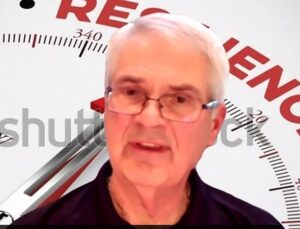 Chaplain Morison, the current PCR Region Chaplain, received the 2022 Military Chaplains Association (MCA) CAP Distinguished Chaplain of the Year Award. A frequent contributor to the Transmitter and The Dispatch Safety Newsletter, he recently served with the CAP Support Team embedded with the HIWG Composite Squadron supporting Maui residents during the devastation caused by wildfires.
Chaplain Morison, the current PCR Region Chaplain, received the 2022 Military Chaplains Association (MCA) CAP Distinguished Chaplain of the Year Award. A frequent contributor to the Transmitter and The Dispatch Safety Newsletter, he recently served with the CAP Support Team embedded with the HIWG Composite Squadron supporting Maui residents during the devastation caused by wildfires.
Chaplain, Major Michael Morison presented the first of two Zoom briefings on Disaster Chaplaincy to Chaplain Corps members on 25 January 2024. A follow-up briefing is scheduled for 28 February. The material Morison presets is based on his findings published in his 2021 doctoral thesis, “The Field of Disaster Today”1
In introducing us to disaster chaplaincy, Morison draws deeply from the CPE (Clinical Pastoral Education) module already a part of the training of many clergy today: showing up; being rather than doing; listening rather than talking; meeting the survivor where they are walking through the pain with another.
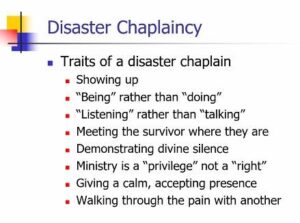 Chaplain Morison presents a comprehensive account of developments in disaster ministry. In the last 15 years, public awareness of disasters has increased dramatically. Media technology has carried major and local disasters into our homes. Following 9/11, many viewers have been emotionally traumatized and retraumatized when replaying disaster footage. Social media, used to provide vital information during disasters, is often a source of misinformation and sensationalized reporting.
Chaplain Morison presents a comprehensive account of developments in disaster ministry. In the last 15 years, public awareness of disasters has increased dramatically. Media technology has carried major and local disasters into our homes. Following 9/11, many viewers have been emotionally traumatized and retraumatized when replaying disaster footage. Social media, used to provide vital information during disasters, is often a source of misinformation and sensationalized reporting.
Only a few years ago, local and national disaster response was managed on the scene by organizations such as the Red Cross and the Salvation Army. In the local community, clergy employed their seminary training to serve as chaplains to police and fire departments and provide counseling for victims, families, and the local community. Shortly after my appointment as CT Wing Chaplain, I was called to assist the chaplain in local squadron following the Sandy Hook school shootings. For several weeks, the town of Newport, CT town was the focus of national media reporting. The reporters and national celebrities finally left, but the rippling effects of disaster induced trauma continued and even increased. I was to discover that my squadron chaplain would become the critical support for his church and community. He also served as the chaplain for the traumatized police and fire department, first responders on the scene.
Clearly, our nation and local communities needed a greater response to disaster support. Since Dandy Hook I have seen local and school community resources rise to meet the need for counseling and suicide prevention. CAP NHQ and the Chaplain Corps developed cadet programs in Wingman, Suicide Prevention. We have done well! I am gratified to report that my local squadron chaplain rose to meet the challenge for his squadron, church, and community. He also discovered that he has a heart and mind for disaster chaplaincy.
Given the growing need in local communities for chaplains trained in disaster response, Chaplain Morison provided us in this session with a template for recruiting local community chaplains to be trained and certified in Disaster Chaplaincy. He outlined the benefits when local clergy are trained to deal with directly with disaster victims and first responders. In a 2001 poll,2 59% of disaster victims preferred to seek counseling from clergy or a religious counselor rather than from a physician or mental health counselor. Morison attributes this preference to a perception that the chaplain possesses greater theological credibility, adheres to standards of confidentiality, and is concerned with the whole person.
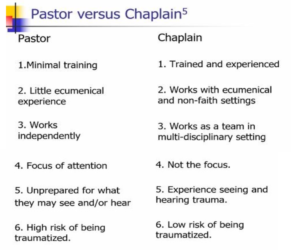 Advocating training for local clergy in disaster chaplaincy, Morison points out the benefits provided by the higher level of training and experience required for Disaster Chaplaincy certification. Experienced in seeing and hearing trauma, disaster chaplains face a lower risk of being traumatized. The disaster chaplain is better equipped to work in ecumenical and non-faith settings encountered in disaster facilities. Whereas local clergy act independently, disaster chaplains function in teams.
Advocating training for local clergy in disaster chaplaincy, Morison points out the benefits provided by the higher level of training and experience required for Disaster Chaplaincy certification. Experienced in seeing and hearing trauma, disaster chaplains face a lower risk of being traumatized. The disaster chaplain is better equipped to work in ecumenical and non-faith settings encountered in disaster facilities. Whereas local clergy act independently, disaster chaplains function in teams.
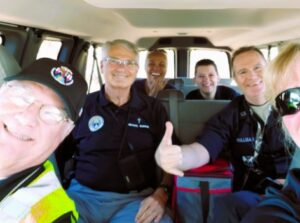 The CAP Chaplain Corps follows the CST model, also employing a team ChESS trained CSS specialists, often certified social workers and health care professionals. In responding to the Maui wildfire disaster, the Chaplain Corps sent a team with Chaplain Col John Murdoch (far left and front) and Chaplain Morison (next right) to support the CAP Hawaii Wing Composite Squadron ground team to provide emotional and spiritual care for survivors and first responders. Squadron members appearing in the photo also included Capt Mulligan Trinettes, C/A1C Johnson, and Maj Christine Everhard.
The CAP Chaplain Corps follows the CST model, also employing a team ChESS trained CSS specialists, often certified social workers and health care professionals. In responding to the Maui wildfire disaster, the Chaplain Corps sent a team with Chaplain Col John Murdoch (far left and front) and Chaplain Morison (next right) to support the CAP Hawaii Wing Composite Squadron ground team to provide emotional and spiritual care for survivors and first responders. Squadron members appearing in the photo also included Capt Mulligan Trinettes, C/A1C Johnson, and Maj Christine Everhard.
1 Michael L. Morison Disaster and Catastrophic Crisis Ministry: Pastoral Response in Time of Terrorism, Human-caused, and Natural Disasters University of Redlands, 2021 Commencement, https://issuu.com/universityofredlands/docs/chimes-summer2021-webissu080221/s/13133250
2 Caravan ORC poll conducted Oct 5-12, 2001
3 MCA News Digest 8.30.23 .
Slides in this article were used by Chaplain Morison in his January 25th briefing.
Other Core Values
by Col James A. Ridley
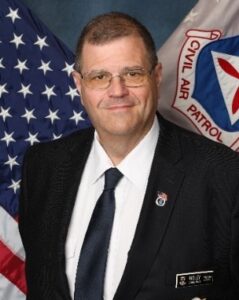 Col James A. Ridley, Sr. is a former Wing Commander and at present is the Northeast Region Chief of Staff and a CDI. Col Ridley has long contributed to the Transmitter on a variety of subjects and their relevance to command and leadership, including but not limited to, topics such as the CAP Core Values, servant leadership and mentoring. His next series of articles will focus on traits all leaders should embody as they progress through their CAP careers and life.
Col James A. Ridley, Sr. is a former Wing Commander and at present is the Northeast Region Chief of Staff and a CDI. Col Ridley has long contributed to the Transmitter on a variety of subjects and their relevance to command and leadership, including but not limited to, topics such as the CAP Core Values, servant leadership and mentoring. His next series of articles will focus on traits all leaders should embody as they progress through their CAP careers and life.
“You must love each other as I have loved you.” John 13:34-35
Every Airman knows their Core Values of Integrity, Volunteer Service, Excellence, and Respect. It is of the last core value, respect, as well as other core values, that in today’s world we must also adhere too that I write about today. Values such as empathy, understanding, and tolerance. Through the course of history people have always questioned the world they live in, the events going on around them, affecting or in many cases, not affecting them but others. Just prior to the United States entrance into both World Wars, there were groups of Americans seeking to keep the country ‘out of Europe’s war’. But as history taught us, there are no boundaries and indeed war did find its way to our shores in both cases.
Why is it that we never seem to learn the lessons of our past? Why is it that history teaches mankind nothing? Why is it that we seem to always be doomed to repeat mistakes others have repeatedly made across the globe for centuries without our understanding the root cause and the means to mitigate the end result? Why are human beings so cruel to each other? We live today in a chaotic world, just as Americans did during the American Civil War. On March 4, 1865, during his second inaugural address, President Abraham Lincoln said it best, “With malice toward none with charity for all with firmness in the right as God gives us to see the right let us strive on to finish the work we are in to bind up the nation’s wounds, to care for him who shall have borne the battle and for his widow and his orphan ~ to do all which may achieve and cherish a just and lasting peace among ourselves and with all nations.” We all could learn something from those words.
Respecting one another, empathizing with their situations, understanding that which divides us and showing tolerance in the face of anger and aggression is something we must all strive for. This is not something that is merely for nations to abide by but all of us. We should demonstrate these values in the workplace, our communities, our houses of worship, and with those around us including family. I have seen and heard of so many friendships and family relationships destroyed over conversations at the dinner table. It is fine to have differences of opinion, but we should all be tolerant of that which divides us, as long as it does not take on the form of barbarism or hateful, cruel acts of violence. Tolerance is a barrier to discrimination. Tolerance does not equal compliance but instead asks people to not demand others relinquish their deeply held beliefs or values for the sake of theirs.
I do not understand why people carry hate in their hearts, or treat others with such animosity and violence, or why simple conversations lead to broken relationships. What I will state is that we must find ways to mitigate these outcomes, if not for our own sakes, but for our children’s.
During the Cold War, which saw the Cuban Missile Crisis threaten a nuclear Armageddon on the world, President John F. Kennedy gave a powerful speech and his words then should be echoed and resonate with mankind today –
“So, let us not be blind to our differences–but let us also direct attention to our common interests and to the means by which those differences can be resolved. And if we cannot end now our differences, at least we can help make the world safe for diversity. For, in the final analysis, our most basic common link is that we all inhabit this small planet. We all breathe the same air. We all cherish our children’s future. And we are all mortal.”
